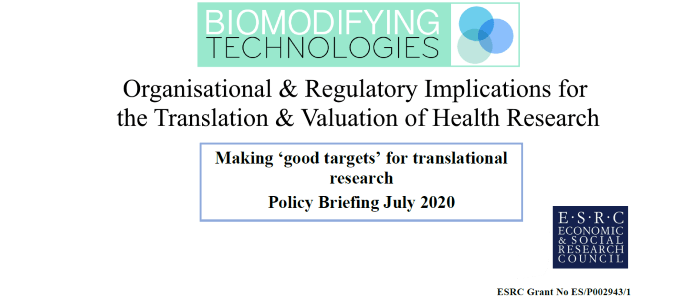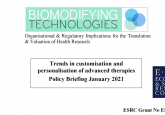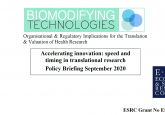Policy briefing: Making ‘good targets’ for translational research

The Biomodifying technologies project was led by the University of Oxford in collaboration with colleagues at the University of Sussex and the University of York (all UK) and funded by the UK Economic and Social Research Council, and aimed to investigate the likely impact of such technology on human health, healthcare and medicine in the UK.
The Biomodifying technologies team consists of Michael Morrison, Jane Kaye (both University of Oxford, UK), Alex Faulkner, Phoebe Li (both University of Sussex, UK), Andrew Webster and Andrew Bartlett (both University of York, UK).
This is the first of four policy briefings. In this briefing, the team set out our understanding of a ‘good clinical target’ in each of the areas studied: gene editing, induced pluripotent stem cells (iPSCs) and 3D bioprinting.
Project member Michael Morrison shares key takeaways and highlights from this briefing or jump to the full briefing below.
What are the key points in this briefing?
Viable clinical applications for each of our case study technologies need to fit the available technological capacity for scale of production and delivery, to target a well-defined patient population where they can outcompete existing care regimens in cost-benefit assessment, and to align with regulatory requirements. We need to evaluate whether we can support multiple advanced therapies aiming at an initially limited set of conditions (for example both cell and gene therapies are in development for eye diseases like Advanced Macular Degeneration), and how we might do this. These initial product niches require support in ways that avoid ‘lock-in’ to one way of doing things, to enable the industry to evolve and expand over time.
What new information does this briefing provide?
We draw on multiple research methods, including analysis of papers and IP filings, literature reviews, and interviews with stakeholders from scientists and clinicians to representatives of SMEs and regulatory agencies. This provided up to date information on the current thinking and the contemporary challenges faced by different groups involved in the translational research pathway, which allows us to build on and extend previous social science work on regenerative medicine and 3D printing, including prior work by members of the project team. There is also input from the parallel ‘Governing biomodification’ project, led by Jane Kaye, on legal and regulatory aspects of gene editing, bioprinting, and iPSC.
Where can people find more information on the points in this briefing?
The main thing to do is to look out for future peer-reviewed journal articles from the project team, which will elaborate on many of the issues described in this and subsequent briefing documents. Some short introductory pieces on the policy issues posed by biomodifying technologies are available through Open Access Government here and here. More general information about the project can be found on our website and an extended project profile is available here.
This project also builds on work from the REGenableMED project led by Andrew Webster.
Making ‘good targets’ for translational research
BioMod-Briefing-1_Making-good-targets-for-translational-research

